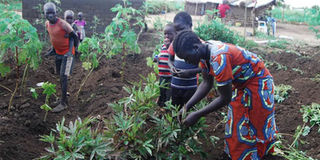Refugees grow own food to supplement government rations

Reaping the fruits. Ms Lucy Ayego (Right) tends to her vegetable garden in Palabek Ogili refugee camp, Lamwo District, last week. PHOTO BY TOBBIAS JOLLY OWINY
What you need to know:
Allocation. Every month, each refugee family is given 10kgs of posho and 2kgs of beans.
Mr Aldo Langoya, a South Sudan refugee, wears a broad smile as he emerges from the backyard of his hut in Palabek Ogili settlement camp to load sweet potatoes into a basin.
Mr Langoya, 37, explains that he will chop the potatoes, dry them for three days and then store them for future consumption.
He explains that the chips are part of the harvest from a garden in his backyard that he hopes to feed his family of seven on.
Mr Langoya is one of thousands of South Sudanese refugees in Lamwo District who are growing their own food in order to supplement the rations given to them by the Office of the Prime Minister (OPM) and the World Food Programme.
According to him, while they appreciate the government and donors’ intervention to feed them, it is not enough for the family. Every month, each refugee family is given 10kgs of posho and 2kgs of beans.
When refugees arrive at the settlement, each household is allocated a plot of land measuring between 30x30 feet and 50x50 feet. It is on these plots that they are meant to grow quick maturing crops to supplement relief food rationed to them.
Mr Langoya, who is also the leader of Block VI in Zone II comprising 670 homesteads, says he recently started mobilising other refugees to embrace backyard farming after realising that some of them were being killed while trying to sneak back to South Sudan to collect food.
“Since we arrived here last April, the food distributed has never been enough to feed a big family like mine. This compelled us to think bigger by growing our own food instead of depending on what is given to us,” he says.
“I went to Palabek Trading Centre and bought boo, malakwang and okra seeds at Shs8,000 and two hand hoes. I then planted the seeds on a 50x50 plot of land behind my structure,” he says.
He reveals that as a result, he has been able to earn a living.
The benefits
“Growing these vegetables has enabled me to sustain my family and has saved me the stress of waiting for food rationed by UNHCR. The savings I make from selling my vegetables has enabled me to buy a second hand motorcycle at Shs1.1million that I have put into boda boda business,” he adds.
Ms Lucy Ayego, 19, another refugee in Zone IV, has been growing okra and potatoes to feed her three younger brothers at the camp.
“If it were not for the food we grow by ourselves, life would be hell since there is hardly any food ration that lasts a fortnight. Sometimes we move to the host communities to work in exchange for food,” she says.
WHAT GOVERNMENT SAYS
Recommendation. Mr Julius Kamuza, an OPM official at the camp, commends the refugees for growing their own food, adding that government always endeavours to provide them with free seeds.
The RDC, Mr Jonathan Rutabingwa, says the increasing food production has empowered refugees economically. “This is also boosting food production in the district because some of them are selling their produce in our local markets outside the camp,” Mr Rutabingwa says. He also notes that as a result, cases of stealing from gardens in host communities by refugees have reduced.




